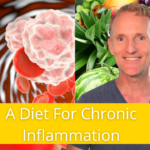Should you follow the ayurvedic diet? Does it help you build your health, or does it harm your health?
The Ayurvedic diet comes from Ayurveda – an ancient wellness practice that originated in India several thousand years ago and the word “Ayurveda” is a combination of two Sanskrit words which in their translation to English means “the science of life.”
Since its inception, a lot has changed in the world, certainly with regards to nutritional science and we now know a great deal about what foods are good for us and which ones are not.
Of course, it goes without saying that the modern SAD diet is a disaster for human health.
Highly processed foods, refined sugar, lots of saturated fat, trans fats, oils, chemical additives, are food ingredients that literally demolish your health.
Now one of the things that the ayurvedic diet teaches people is that human beings have 3 doshas: vata, pitta, and kapha, and these are believed to be energetic forces of nature that are found in the human body and mind.
Based on what is determined as being someone’s dominant dosha they are then supposed to eat a certain way for optimal health.
Now as human beings in truth we are naturally designed as frugivores, so this means consuming a diet that has lots of fruits and soft vegetables in it.
Yes, there are other foods that humans can eat but this should not include foods in the ayurvedic diet like dairy and eggs.
Why is that?
Because science is now very clearly showing us that we are designed to eat lots of plant foods and not a diet that has animal foods in it.
Ready For Your Big Health Leap?
I’m excited to invite you to our FREE online training.
During this masterclass, I’ll walk you through the 5 steps our clients use to reverse gut health issues and balance their hormones… while never restricting themselves of carbohydrates and sugar.









Nice blog. Just a note on Ayurveda: it does not promote eggs. That’s a western introduction like meat. Traditional Hindus never ate eggs or chicken what to speak of cows. Ayurveda does recommend a raw fruit diet aka the yogi diet (yogis live off the produce of the forest uncooked), but it recognizes in this age all people can’t or won’t live that way. In the Satya-Yuga or Age of Truth or Dharma, humans all eat a raw diet basically (time and ages cycle in Hinduism). In this age, Kali-Yuga, it describes humans as more degraded and meat-eaters, even killing the cow which is seen as one of the seven mothers. So Ayurveda accommodates people who eat cooked foods, but not meat or eggs. You will sometimes find them in Ayurvedic books but these are modern concoctions and not authoritative or traditional, rather such books are based on the whims of the author.
Why does a Ayurveda recommend milk? Well Brahmin cows (Bos taurus indicus, the cows with humps) for one produce A2 milk which can be digested easier by most humans. Ayurveda also recommends particular recipients for preparing milk to balance the doshas and make it easier to digest as well, such as adding certain herbs like cardamom and cinnamon, turmeric, clove. Milk also is a complete protein and contains b12, something vegans find might find hard to come by in food form. When cows are shown affection they will produce milk for many years after giving birth. Milk is meant to be a nourishing foodstuff, unlike eggs or meat.
Although it’s often said humans are the only animals who drink another animal’s milk, this is not true (many animals including birds have been known to drink other species’ milk, as well as monkey, dogs, hogs, etc). Humans have a symbiotic relationship with cows and bulls. A cow produces more milk than its calf will drink, and if given love and affection will produce milk for years after giving birth (just naming cows has been shown to increase their milk production). Cows are also artificially forced to reproduce and increase their numbers. There are many such brahmin cows who thrive even better in a forest setting.
Brahmin cows eat a variety of plants and graze in the forests, unlike most western breeds who mostly graze on grass. The variety further enriches it’s milk. Brahmins have hooves specially made for rough, uneven surfaces ideal for forests. It is a symbiotic relationship with humans.
Pasteurization and homogenization allow the milk particles to enter the blood stream essentially. If raw milk is prepared and heated using herbs Ayurvedic style it is digested even easier and the herbs add more benefits.
When you milk a cow and let the milk sit, the cream will rise to the top. This is called unhomogenized milk. Nowadays most of the milk is homogenized so you don’t see that layer of cream at the top anymore. But homogenized milk isn’t as nourishing and can contribute to heart disease and clogged arteries due to this processing of the fat molecules. You must boil the milk to melt down the fat globules for best absorption into your cells, otherwise it will clog your throat and sinuses. Pasteurized milk as well as added hormones and chemicals obviously aren’t good either.
Milk in Ayurveda is recommended in moderation or else it can have negative impacts. Otherwise the cholesterol isn’t an issue.
And boiling the milk forms tryptophan which helps you make more serotonin which makes you both happy and calm. This is why drinking warm milk before bed can contribute to a deep restful sleep.
Many thousands of patients have reincorporated milk back into their diets and have experienced the strength, stamina and radiant health that warm whole milk can bring back to our depleted bodies.
Raw plant diet (“yogi diet”) is the best as per Ayurveda; it just makes accommodations for those who want cooked food (most people).